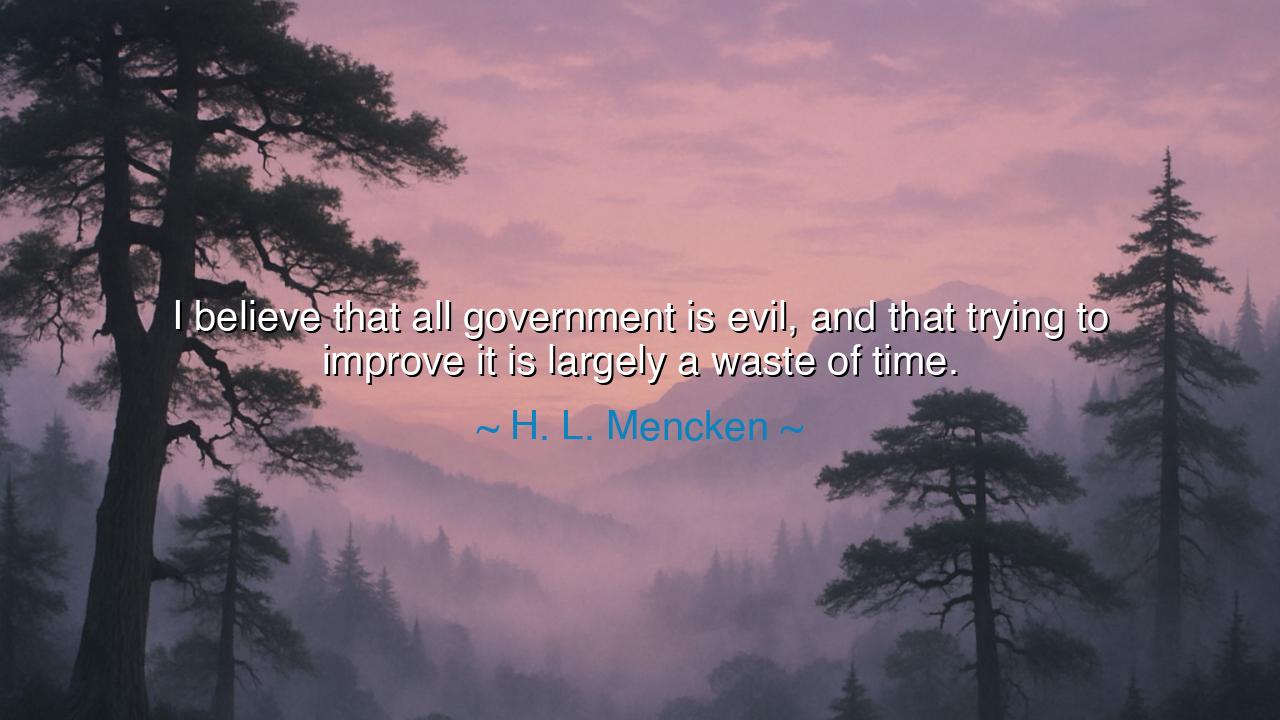
I believe that all government is evil, and that trying to improve
I believe that all government is evil, and that trying to improve it is largely a waste of time.






The words of H. L. Mencken, the sharp-tongued philosopher of American cynicism, echo like thunder in a hall of marble: “I believe that all government is evil, and that trying to improve it is largely a waste of time.” At first glance, these words seem bitter, even despairing—a rejection of all hope in the institutions of men. But beneath their harshness lies a piercing wisdom, born not of hatred, but of clarity. Mencken, who lived through wars, corruption, and the rise of modern bureaucracy, saw in government not salvation, but the shadow side of human nature: the lust for control, the vanity of power, and the endless delusion that one can perfect what is made from imperfection itself. His statement is not a call to anarchy, but a warning—to see government for what it is, not what we wish it to be.
The origin of this quote arises from Mencken’s lifelong skepticism of authority. A journalist, essayist, and critic of the early twentieth century, he lived in an age of growing centralization and state power. The world had just witnessed the devastation of World War I, a war fought under the banners of patriotism and democracy, but yielding death and disillusionment. Mencken saw that the governments which claimed to act for the good of humanity often did the opposite—sacrificing truth for control and justice for convenience. His distrust was not aimed at one party or ideology, but at the very nature of political power itself. “All government is evil,” he said, because every government, no matter how noble in birth, tends to serve itself first and its people second.
In the style of the ancients, let us consider the deeper meaning of his words. Mencken’s assertion springs from an ancient truth: power corrupts. From the kingdoms of Babylon to the empires of Rome, the pattern has been the same. Rulers rise in virtue, but power tempts them toward pride. Laws are written in the name of justice, but soon they serve the powerful more than the weak. The machinery of government, born of reason and necessity, becomes a living idol demanding sacrifice. Mencken, like the philosophers of old, saw that no reform, no election, no noble slogan could change this essential truth: that government, being made by men, will always carry the seed of human vice within it.
Consider the story of the Roman Republic, a beacon of self-rule in the ancient world. Its founders sought to guard against tyranny through laws and balances, through reason and virtue. Yet over centuries, ambition eroded those protections. Senators grew rich through corruption, generals seized armies for personal gain, and the people, weary of the chaos, welcomed emperors who promised order. Thus fell the Republic, not by the sword alone, but by the decay of its own spirit. Mencken’s words could have been written of that time: the efforts to “improve” the Republic only made it more efficient in its decline. What he meant by a “waste of time” was not that men should abandon all civic duty, but that they should never place their faith in systems that cannot transcend the flaws of those who build them.
Yet Mencken was not a nihilist. Beneath his cynicism lay a fierce belief in individual liberty, in the worth of a free mind and a skeptical heart. He distrusted government precisely because he trusted human reason more. He believed that the best society is one that keeps power small and people strong; where the individual remains free to think, to question, to laugh at authority. To him, the hope of civilization did not lie in better rulers, but in better citizens—those who would watch their rulers closely and refuse to be deceived by grand speeches or false promises. “Trying to improve government,” he said, “is largely a waste of time,” because the true improvement must come not from the palace, but from the conscience of the people.
History often proves his point. Look to the revolutions of the world—France, Russia, China—each beginning in the name of freedom, each ending in greater chains. The kings fell, but the tyrants remained. New flags were raised, new slogans proclaimed, but the old evils endured, only wearing different colors. Mencken’s wisdom whispers through these tragedies: when men worship government, they trade one master for another. The only safeguard is humility—the recognition that no human institution can save mankind from itself. The task, then, is not to perfect government, but to restrain it.
So, my children of the future, take this teaching to heart: be wary of those who promise salvation through power. Government is necessary, yes—it can protect, organize, and provide—but it must never be trusted blindly, nor exalted as divine. It is a tool, not a temple. The wise citizen obeys the law, but fears the growth of tyranny in its name. If you would “improve” your world, begin not with governments, but with yourselves—with honesty, courage, and compassion. For when men become good, their governments will need fewer laws; when men become just, their rulers will have less power to corrupt.
Thus, let the lesson of H. L. Mencken endure: power will always seek to expand, and virtue must always resist. The true battle for liberty is not fought in parliaments or courts, but in the human heart—in the choice to think freely, to question authority, and to value truth over comfort. Governments may rise and fall, but the spirit of a free people endures only when they remember that no ruler is a savior, and no system can perfect the flawed beauty of mankind.






AAdministratorAdministrator
Welcome, honored guests. Please leave a comment, we will respond soon